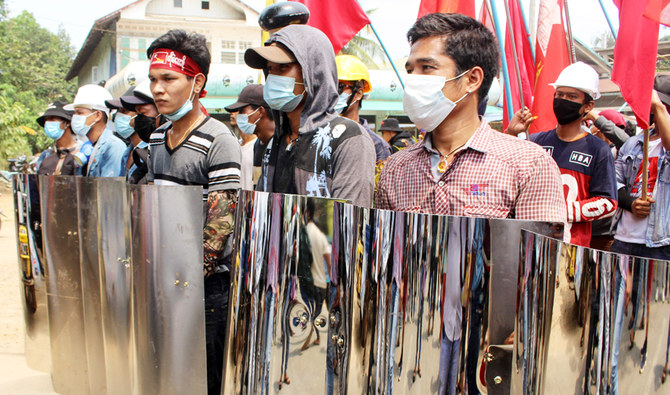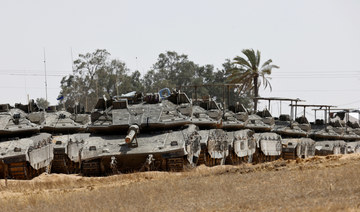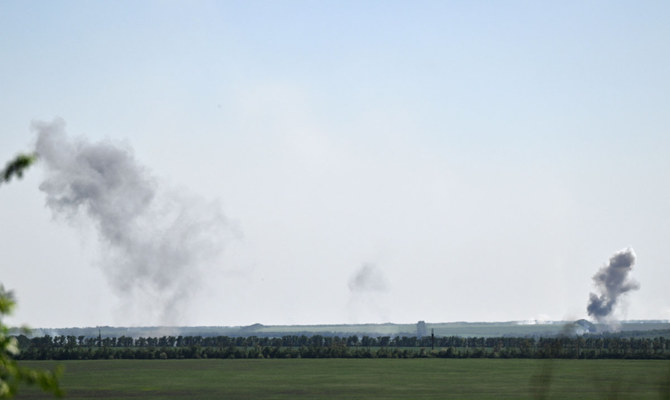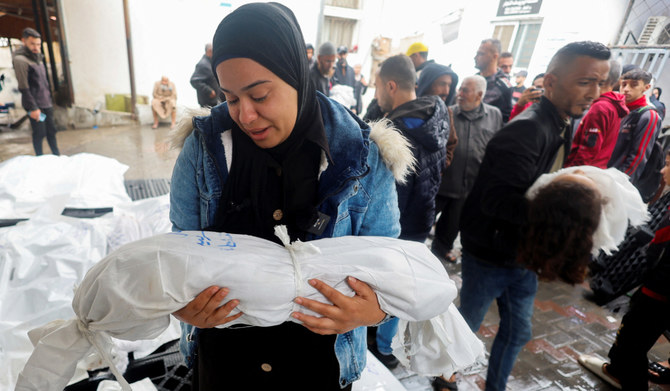YANGON: As Myanmar’s military celebrated the annual Armed Forces Day holiday with a parade Saturday in the country’s capital, soldiers and police elsewhere killed scores of people while suppressing protests in the deadliest bloodletting since last month’s coup.
The online news site Myanmar Now reported late Saturday that the death toll had reached 114. A count issued by an independent researcher in Yangon who has been compiling near-real time death tolls put the total at 107, spread over more than two dozen cities and towns. That’s more than the previous high on March 14, which ranged from 74 to 90.
The death toll in Myanmar has been steadily rising as authorities grow more forceful in suppressing opposition to the Feb. 1 coup that ousted the elected government of Aung San Suu Kyi. The coup reversed years of progress toward democracy after five decades of military rule.
Figures collected by the Yangon researcher, who asked not to be named for his security, have generally tallied with the counts issued at the end of each day by the Assistance Association of Political Prisoners, which documents deaths and arrests and is widely seen as a definitive source. The Associated Press is unable to independently confirm the death tolls.
Up through Friday, the association had verified 328 deaths in the post-coup crackdown.
The killings quickly drew international condemnation, including a joint statement from the defense chiefs of 12 countries.
'This bloodshed is horrifying'
US Ambassador Thomas Vajda said on social media: “This bloodshed is horrifying,” adding “Myanmar’s people have spoken clearly: they do not want to live under military rule.”
The EU delegation to Myanmar said Saturday would “forever stay engraved as a day of terror and dishonor.”
The top military officer from the United States and nearly a dozen of his counterparts joined to condemn the killings by Myanmar’s army.
Their statement said that a professional military must follow international standards for conduct “and is responsible for protecting — not harming — the people it serves.”
UN Special Rapporteur Tom Andrews said it was time for the world to take action — if not through the UN Security Council then through an international emergency summit. He said the junta should be cut off from funding, such as oil and gas revenues, and from access to weapons.
“Words of condemnation or concern are frankly ringing hollow to the people of Myanmar while the military junta commits mass murder against them,” he said in a statement.
“The people of Myanmar need the world’s support. Words are not enough. It is past time for robust, coordinated action.”
Emboldened with friends elsewhere
Despite the Western condemnation, Myanmar’s junta has friends elsewhere.
Russia’s deputy defense minister Alexander Fomin attended Saturday’s military parade in Naypyitaw, having met senior junta leaders a day earlier.
Diplomats said eight countries — Russia, China, India, Pakistan, Bangladesh, Vietnam, Laos and Thailand — sent representatives, but Russia was the only one to send a minister to the parade on Armed Forces Day, which commemorates the start of the resistance to Japanese occupation in 1945.
Support from Russia and China, which has also refrained from criticism, is important for the junta as those two countries are permanent members of the United Nations Security Council and can block potential UN actions.
The junta's motivation
In his speech Saturday, Min Aung Hlaing used the occasion to try to justify the overthrow of Suu Kyi’s government, accusing it of failing to investigate irregularities in last November’s general election, and repeating that his government would hold “a free and fair election” and hand over power afterward.
The military has claimed there were irregularities in the voting rolls for the last election, which Suu Kyi’s National League for Democracy party won in a landslide.
The junta detained Suu Kyi on the day it took power, and continues to hold her on minor criminal charges while investigating allegations of corruption against her that her supporters dismiss as politically motivated.
Phil Robertson, deputy Asia director for New York-based Human Rights Watch, said Saturday’s events showed that the military, known in Myanmar as the Tatmadaw, should be prosecuted in international courts of law.
“This is a day of suffering and mourning for the Burmese people, who have paid for the Tatmadaw’s arrogance and greed with their lives, time and time again,” he said.
Clash with rebels
Myanmar military forces also on Saturday engaged in combat with guerrillas of the Karen ethnic minority near the country’s eastern border with Thailand.
The Karen National Union, the leading political body for the ethnic group, announced that its armed wing, the Karen National Liberation Army, had overrun a small government military outpost, and captured eight soldiers.
In apparent retaliation, government warplanes on Saturday night carried out strikes on Mutraw district where the KNLA’s 5th Brigade that carried out the morning attack is based and where there is also a large civilian settlement. Hsa Moo of the Karen Peace Support Network, who spoke to villagers from there, said the air attack killed two people and wounded two others while also damaging several houses, Some of the survivors fled to the jungle to hide.
The KNU is one of more than a dozen ethnic armed organizations that have been fighting for decades to gain more autonomy from Myanmar’s central government. There have been calls for them to band together and lend support to the fight against the country’s new ruling junta.
























